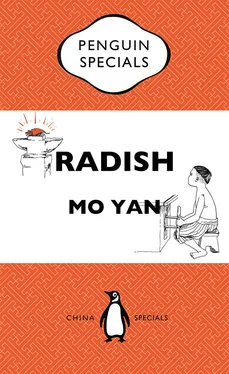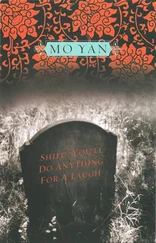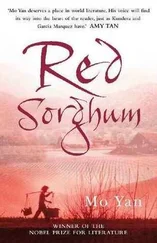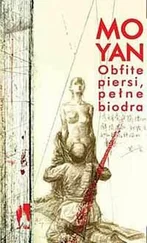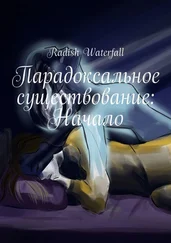‘What have you done with Hei-hai?’ the mason demanded of the young blacksmith.
‘What are you worried about? He’s not your son, is he?’
‘Where is he?’ Juzi asked, boring her eyes into the blacksmith’s.
‘Just hold on.’ he said amiably. ‘He’s out scrounging sweet potatoes. Stick around; we’ll bake some when he gets back.’
‘You sent him out to steal?’
‘What do you mean, steal? It’s not stealing if he doesn’t take them home,’ the blacksmith explained.
‘Then why didn’t you do it?’
‘I’m his mentor.’
‘That’s horseshit!’
‘So what if it is?’ the blacksmith said as his eye lit up. ‘Where the hell did you go for sweet potatoes, Hei-hai?’ he shouted out of the bridge opening. ‘Albania?’
Hei-hai, his shoulders askew, staggered in carrying his bucket with both hands. He was covered with mud, as if he’d rolled around in the dirt.
‘Hey, my boy,’ the blacksmith complained loudly, ‘I sent you out for a few. Who told you to bring back a bucketful? Take the radishes over to the pond to wash off the mud.’
‘No,’ Juzi said. ‘Quit giving him orders. You bake the potatoes while I go wash the radishes.’
The blacksmith stacked the sweet potatoes next to the forge and calmly lit a fire. Juzi returned with the radishes and laid them out on a dry rock. One dropped to the ground, where it rolled to the mason’s feet, quickly getting coated in iron filings. He leaned over to pick it up.
‘Here, I’ll go wash it again.’
‘No need. Five large radishes is plenty,’ the mason said as he laid the errant radish on the anvil.
Hei-hai walked up and took the bellows handle from the blacksmith. The blacksmith glanced at the woman before saying to him, ‘You need a rest, you little shit. Do your palms get itchy when you’re not doing something? Take the bellows, just don’t say I didn’t warn you. Take it slow, the slower the better. Otherwise you’ll burn them.’
The mason and the woman sat against the western wall of the bridge opening, while the young blacksmith sat behind Hei-hai. The old blacksmith sat on his bed on the north side, looking south; the tobacco in his pipe had burned out, but he still held the bowl in both hands, resting his elbows on his knees.
The night deepened. Hei-hai continued gently working the bellows, the emerging air sounding like a sleeping baby’s breathing. The sound of flowing water grew clearer, as if it had both shape and colour, that it could be smelled and seen. Barely visible shadows on the levee looked like small animals chasing each other. The sound of their claws in the sand as minute as fine animal hair pierced the bright river music like long, thin, silver threads. Jute plants near the floodgate brushed against each other, creating a sustained rustle. Only one gas lamp remained lit on the worksite. After a moment of confusion, the light-seeking insects that had surrounded the other two lamps swarmed toward the forge. In their frantic search for light, they peppered the glass shade of the remaining lamp with their bodies. The mason went to the lamp and pumped it with a clacking sound. A single cricket forced its way in through a crack in the lamp glass and knocked over the asbestos mantle, casting the bridge into darkness. It took them all a moment to make out faces. The air from Hei-hai’s bellows made the fire in the forge ripple like soft red silk. The bridge opening was filled with the scent of baked sweet potatoes, which the young blacksmith turned over with his tongs. The aroma thickened. At last, their hands full of radish and sweet potato, they ate. Steam rose from the peeled sweet potatoes. Then one bite cold, one bite hot, one bite devoured, one bite savoured — chomp, slurp — beads of sweat on nose tips. The young blacksmith ate one radish and two sweet potatoes more than the others. The old blacksmith did not eat; he sat rigid as a statue.
‘Are you going home, Hei-hai?’ asked the woman.
Hei-hai licked the bits of sweet potatoes stuck to his lips. His belly bulged.
‘Will your stepmother leave the door open for you?’ the mason asked. ‘You can sleep here on the wheat stalks if you want.’
Hei-hai coughed and flung a piece of potato skin into the forge, and then made it curl with a pump of his bellows. A burnt smell permeated the opening.
‘What was that for, you little bastard?’ the young blacksmith said. ‘Why bother going home? I’ll adopt you as son and apprentice. We’ll roam the world together. I guarantee you’ll eat good food and drink strong liquor!’
Before his voice had faded away, the strains of a melancholy song filled the bridge opening, raising goose pimples of joy on the mason’s skin. He had heard the words of this song or aria only days before.
For love of your sword, your learning, your youthful virility
I followed you across the earth, wracked by storm and hunger, enduring countless hardships…
The old man rested his back against the flashboard, where wind from the jute field blew through the cracks above him. Strands of white hair fluttered along with the dancing coal flame in the forge. Deep feeling played on his face; his narrow jaw muscles squirmed, his eyes were like burning coals.
… A bed shared three years, those heavenly pleasures and so much love, all trodden down like muck. I fanned you on summer nights, I warmed your feet on wintry eves. The fruits of my breast, the furnace in my belly… Yet you, with your high station, your bountiful land, have abandoned me for your wife’s chambers. And I, I am a desolate slave…
Juzi’s heart was in her throat, her mouth half open, her lashes seemingly frozen on her face as she gazed at the old blacksmith’s expressive face and his long neck, on which the Adam’s apple slid up and down like a bead of mercury. The plaintive, brooding melody battered her heart like an autumn rain, but just as she was about to cry, the song turned spirited and expansive, and her heart fluttered like willow branches tossed in the wind. A tingling spread from her spine to the top of her head, and she instinctively leaned against the mason’s shoulder, taking his large, callused hand in hers, her eyes moist with tears as she was enveloped in the old blacksmith’s song, in his mood. His gaunt face burned with radiance, and she saw in it a future for her, much like that in his song.
The mason wrapped his arm around her, and again rested his large hand on her firm breast. The young blacksmith, sitting behind Hei-hai, began to squirm. He heard his master bray like an old donkey; a harsh, ugly sound. But soon he was deaf even to that. He rose up on his haunches and cocked his head; his left eye seemed to rise up with him, its gaze like a claw that scratched and gouged the woman’s face. When the mason had tenderly placed his hand on the woman’s breast, a fire was kindled in the young blacksmith’s gut. Flames flew up into his throat and burst from his nose and mouth. It felt to him as if he were crouching on a taut spring, that if he let go he would shoot into the air to crash against the floodgate’s steel and concrete surface. He held on, grinding his teeth.
Hei-hai grasped the bellows handle with both hands. The fire in the forge had weakened, and a blue and a yellow flame danced on the lumps of coal. Occasionally, the flow of air lifted the tongues of fire high above the forge bed, where they floated in the air before being brought down by human movement below. The boy, oblivious to the others, tried to train one eye on each of the tongues of fire, one yellow and the other blue, but could not manage to split his gaze into two. Disheartened, he moved his gaze from the fire and looked from side to side before fixing it on the anvil crouching in front of the forge like an enormous beast. For the first time, his mouth opened wide, and he released a sigh of emotion (a sound drowned out by the old blacksmith’s song). His eyes, big and bright to begin with, now shone like searchlights as he witnessed a strange and beautiful sight: a soft blue-green light suffused the sleek surface of the anvil, on which rested a golden radish. In shape and size it was like a pear, though it had a long tail, every fibre of which was a strand of golden wool. Glittering and transparent, exquisitely limpid, its golden skin revealed a swirling silvery liquid inside. Its contours were clean and elegant; golden rays spread out from its beautiful curves, some long, some short — the long rays like beards of wheat, the short like eyelashes — and all were gold in colour.
Читать дальше
